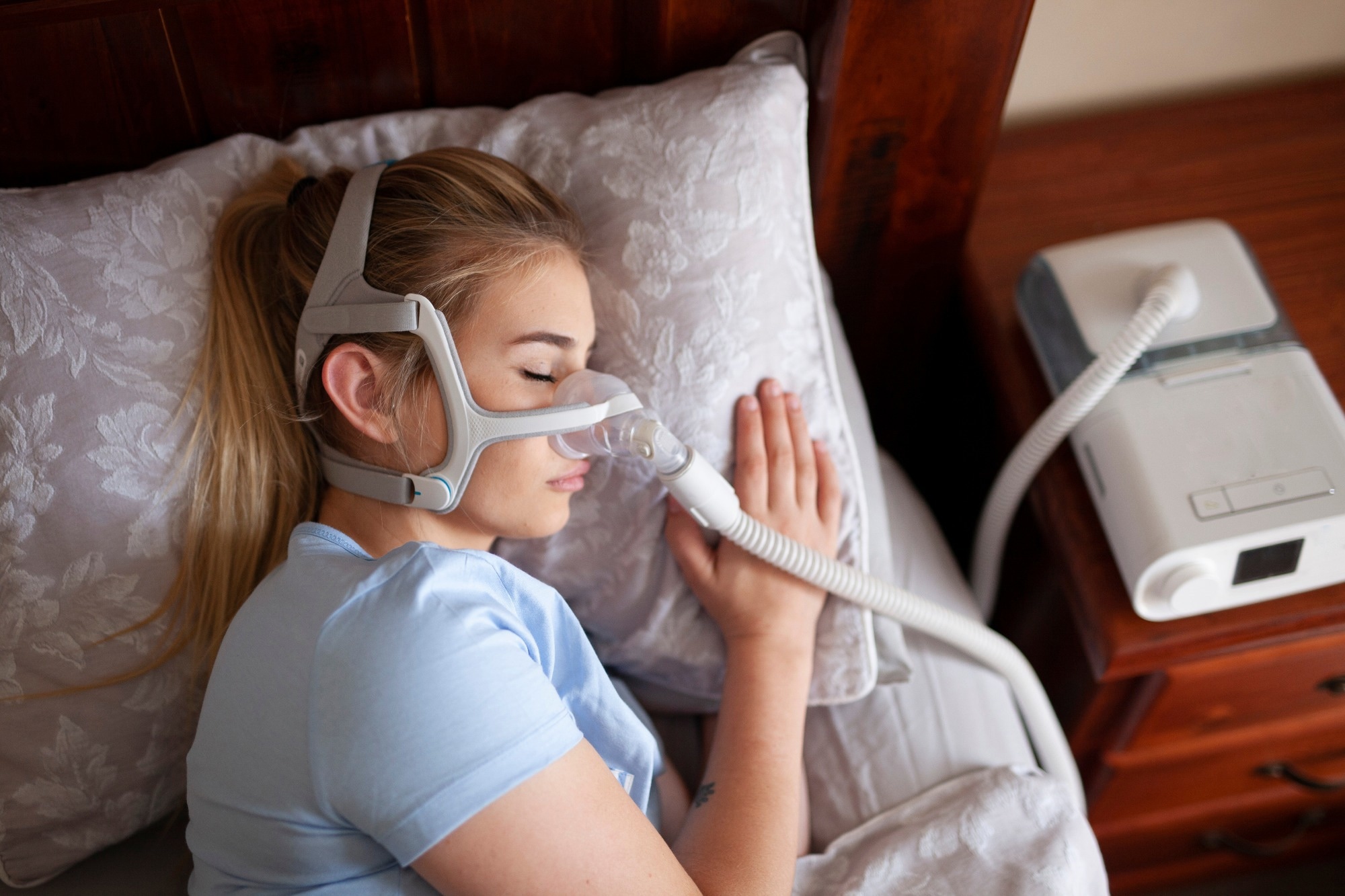
Research reveals both protective and harmful gut microbiota associated with sleep apnea risk
In a study published in Nutrients, researchers from China used multiple Mendelian randomization (MR) analyses to investigate the causal relationship between gut microbiota, associated metabolites, and obstructive sleep apnea (OSA).
They found that while the genera Subdoligranulum and Ruminococcaceae were associated with an increased risk of OSA, Eggerthella, and Eubacterium had a lower risk of OSA.
The gut-microbiota-derived metabolites, namely 3-dehydrocarnitine, epiandrosterone sulfate, and leucine, were identified as potential risk factors for OSA.
 Study: Causality Investigation between Gut Microbiota, Derived Metabolites, and Obstructive Sleep Apnea: A Bidirectional Mendelian Randomization Study. Image Credit: Independence_Project/Shutterstock.com
Study: Causality Investigation between Gut Microbiota, Derived Metabolites, and Obstructive Sleep Apnea: A Bidirectional Mendelian Randomization Study. Image Credit: Independence_Project/Shutterstock.com
Background
OSA is a common sleep disorder leading to disrupted sleeping patterns, intermittent hypoxia (IH), as well as ailments of cardiovascular, cognitive, and metabolic nature. Although various causes of OSA have been identified, their underlying etiologies remain poorly understood.
Patients with OSA are reported to undergo significant changes in their gut microbiome, the collection of microbes in the gastrointestinal tract. Additionally, OSA is also shown to result in altered levels of various serum metabolites related to oxidative stress, IH, and hypertension.
However, limitations in the current research methods challenge establishing a causal relationship between gut microbiota and OSA.
Therefore, the present study aimed to use MR analysis to investigate the causative impact of 196 gut microbial groups and 83 microbiota-derived metabolites on OSA, to shed new light on the role of the gut microbiota on the etiology and pathology of OSA, to aid the identification of new treatment strategies.
About the study
For the present study, 196 known microbial taxa were included from European-population data obtained from the Genome-wide Association Study (GWAS). Additionally, 83 microbiota-associated metabolites were selected using the Human Metabolome Database (HMDB) data.
Two-sample MR analysis was conducted using various methods such as the inverse variance weighted (IVW), MR-Egger, and weighted median (WM) methods to: (i) assess the bidirectional causal relationship between gut microbiota/metabolites and OSA, and (ii) screen the microbes and metabolites associated with OSA.
The robustness of the MR results was validated using the leave-one-out analysis and funnel plot. The MetaboAnalyst tool was employed to interpret metabolite function.
Further, to check whether these microbiota and metabolites independently affect OSA, multivariate MR analysis was performed, which accounted for confounding factors such as obesity, gender, and smoking. The potential heterogeneity among instrumental variables (IVs) was determined using Cochran’s IVW Q statistics.
Results and discussion
The confounding bias of weak IVs was avoided, as shown by the global F-value, estimated in the range 17.75–760.95.
As per the study, 14 microbial taxa were found to be associated with OSA, of which seven taxa, including Actinobacteria, Peptostreptococcaceae, Ruminococcaceae_UCG009, Subdoligranulum, Butyricimonas, Clostridium, Coprococcus3 were associated with a greater risk of OSA.
Further, seven microbiota taxa, including Ruminococcaceae, Anaerotruncus, Coprococcus2, Eggerthella, Enterorhabdus, Eubacterium (xylanophilum group), and Holdemania were observed to be associated with a decreased risk of OSA.
To examine the effect of OSA on the chosen 196 taxa, reverse MR analysis was performed, which showed a minor causal impact of OSA on Ruminococcaceae, Actinomyces, Collinsella, Desulfovibrio, and Slackia.
In the bidirectional analysis of the chosen 83 metabolites, while betaine, gamma-glutamylvaline (γ-EV), and kynurenine showed protective effects against OSA, 3-dehydrocarnitine, androsterone sulfate, butyrylcarnitine, epiandrosterone sulfate, leucine, and phenylalanylphenylalanine were found to be associated with an increased risk of OSA.
In the reverse MR analysis, exposure to OSA was suggestively associated with gamma-glutamylmethionine, guanosine, and succinylcarnitine.
Interestingly, the metabolites associated with OSA were related to amino acid metabolism, tRNA biosynthesis, and purine metabolism pathways. Heterogeneity was observed in IVs only while assessing the relationship between betaine, leucine, and OSA.
Multivariate MR analysis helped identify 3-dehydrocarnitine, epiandrosterone sulfate, and leucine as potential independent risk factors for OSA.
Although this is the first study to evaluate the bidirectional causal relationship between gut microbiota, derived metabolites, and OSA risk, further research is needed to confirm these findings using species-level data representing more diverse populations.
Additionally, the dynamics of this association can further be explored by monitoring the changes in gut microbiota composition and studying the development of OSA in healthy individuals, as well as by considering the interactions among the microbial communities in the gut.
Conclusion
In conclusion, the findings of this study emphasize the potential influence of gut dysbiosis, altered metabolite levels, and pro-inflammatory responses on OSA.
The evidence and insights offered by the study about the potential gut-microbiome-mediated pathogenesis of OSA opens new avenues for developing targeted treatment strategies such as probiotic consumption and fecal microbiota transplantation, thereby improving health outcomes in OSA patients.
-
Yan W, Jiang M, Hu W, Zhan X, Liu Y, Zhou J, Ji J, Wang S, Tai J., (2023) Causality Investigation between Gut Microbiota, Derived Metabolites, and Obstructive Sleep Apnea: A Bidirectional Mendelian Randomization Study. Nutrients, 15(21):4544., doi: https://doi.org/10.3390/nu15214544. https://www.mdpi.com/2072-6643/15/21/4544
Posted in: Medical Science News | Medical Research News | Medical Condition News
Tags: Amino Acid, Clostridium, Dysbiosis, Fecal Microbiota Transplantation, Gastrointestinal Tract, Genome, Hypoxia, Leucine, Metabolism, Metabolite, Metabolites, Metabolome, Microbiome, Nutrients, Obesity, Obstructive Sleep Apnea, Oxidative Stress, Pathology, Probiotic, Purine, Research, Sleep, Sleep Apnea, Sleep Disorder, Smoking, Stress

Written by
Dr. Sushama R. Chaphalkar
Dr. Sushama R. Chaphalkar is a senior researcher and academician based in Pune, India. She holds a PhD in Microbiology and comes with vast experience in research and education in Biotechnology. In her illustrious career spanning three decades and a half, she held prominent leadership positions in academia and industry. As the Founder-Director of a renowned Biotechnology institute, she worked extensively on high-end research projects of industrial significance, fostering a stronger bond between industry and academia.